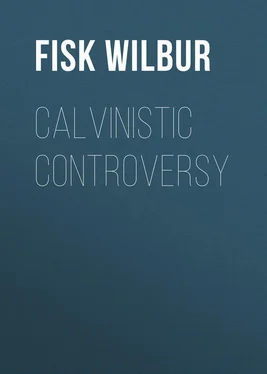Wilbur Fisk - Calvinistic Controversy
Здесь есть возможность читать онлайн «Wilbur Fisk - Calvinistic Controversy» — ознакомительный отрывок электронной книги совершенно бесплатно, а после прочтения отрывка купить полную версию. В некоторых случаях можно слушать аудио, скачать через торрент в формате fb2 и присутствует краткое содержание. Жанр: foreign_antique, foreign_prose, на английском языке. Описание произведения, (предисловие) а так же отзывы посетителей доступны на портале библиотеки ЛибКат.
- Название:Calvinistic Controversy
- Автор:
- Жанр:
- Год:неизвестен
- ISBN:нет данных
- Рейтинг книги:4 / 5. Голосов: 1
-
Избранное:Добавить в избранное
- Отзывы:
-
Ваша оценка:
- 80
- 1
- 2
- 3
- 4
- 5
Calvinistic Controversy: краткое содержание, описание и аннотация
Предлагаем к чтению аннотацию, описание, краткое содержание или предисловие (зависит от того, что написал сам автор книги «Calvinistic Controversy»). Если вы не нашли необходимую информацию о книге — напишите в комментариях, мы постараемся отыскать её.
Calvinistic Controversy — читать онлайн ознакомительный отрывок
Ниже представлен текст книги, разбитый по страницам. Система сохранения места последней прочитанной страницы, позволяет с удобством читать онлайн бесплатно книгу «Calvinistic Controversy», без необходимости каждый раз заново искать на чём Вы остановились. Поставьте закладку, и сможете в любой момент перейти на страницу, на которой закончили чтение.
Интервал:
Закладка:
Wilbur Fisk
Calvinistic Controversy / Embracing a Sermon on Predestination and Election and Several Numbers, Formally Published in the Christian Advocate and Journal
ADVERTISEMENT
The numbers following the sermon on predestination and election, were written at different times, and in some instances at quite distant intervals from each other. This will be received, it is hoped, as an apology for any want of connection or uniformity of style, which the reader may notice. And if any farther apology be necessary, it may be found in the fact, that the entire contents of the volume as it is now presented, were written in the midst of other pressing duties. – And the same reason has prevented my giving the work such a thorough revision, as it should have had, before it was presented to the public, in the more set and imposing form of a book. Such a form was not originally thought of – and now that this is called for, the author is well aware that the public might expect a careful revision and correction of the whole. From this however, he must, of necessity , be excused. He has been able to do little more than correct the typographical errors. If the public have it, therefore, it must go “with all its imperfections on its head.” Only let it be understood, that I do not send it out . The publishers say it is called for; and I consent that it may go. The doctrines I believe, will stand the test of reason and Scripture, although some of the arguments by which they are defended may be found defective.
It was my original design to have added one or two numbers on election; but upon farther reflection, it appeared to me that enough had been said in the sermon on that point; and that at any rate, if Calvinian predestination, and the Calvinistic views of moral agency and regeneration, were found to be fallacious, the whole superstructure must fall of course. On these points therefore, we may safely rest the entire question between us and the Calvinists.
W. Fisk. Wesleyan University, April 28, 1835.A DISCOURSE
ON
PREDESTINATION AND ELECTION
According as he hath chosen us in him before the foundation of the world, that we should be holy and without blame before him in love.
Having predestinated us unto the adoption of children, by Jesus Christ, to himself, according to the good pleasure of his will, Ephesians i, 4, 5.
In this passage, the kindred doctrines of predestination and election are brought into view. To discuss them, to notice some errors respecting them, and to exhibit what is believed to be the Scriptural and rational view of these doctrines, is the proposed object of the present discourse. In doing this, much that is new cannot be expected. The whole ground of this controversy has been examined and re-examined; and the various arguments, on both sides, have been urged and opposed, by the most able polemics in philosophy and theology. The most, therefore, that can now be expected, is to give a concise view of the subject, in a form and manner suited to the present state of the controversy, and to the circumstances of the present congregation.
It is hoped, at least, that the subject may be investigated in the spirit of Christianity; and that there will be no loss of brotherly and Christian candour, if there be no gain, on the side of truth. Yet, in a desire to give no offence, I must not suppress the truth, nor neglect to point out, as I am able, the absurdity of error, and its unprofitable influences on the minds of those who propagate or receive it. The truth should be spoken, but it should be spoken in love. Neither the subject, nor the age, nor the occasion, will admit of temporizing. With these views, we come to our subject, by examining,
I. Predestination in general;
II. Predestination, in its particular relation to the doctrine of election.
I. By predestination, we understand an efficient predetermination to bring about or accomplish any future event. But as God alone has knowledge to comprehend futurity, and power to direct and control future events; predestination, in a proper and strict sense, can only be used in reference to him. And with respect to God, predestination is that efficient determination which he has maintained from eternity, respecting the control, direction, and destiny of the laws, events, and creatures of the universe. – That God hath a predetermination of this kind, there can be no doubt; and therefore, on this fact, there can be no dispute. But the ground of controversy is, the unlimited extent to which some have carried this idea of predestination. Calvin, on this subject, says, “Every action and motion of every creature is governed by the hidden counsel of God, so that nothing can come to pass, but was ordained by him.” The Assembly’s Catechism is similar: – “God did, from all eternity, unchangeably ordain whatever comes to pass.” And Mr. Buck defines predestination to mean, “The decree of God, whereby he hath, for his own glory, foreordained whatever comes to pass.” With these definitions, which, it is seen, are the same in substance, agree all the Calvinistic divines in Europe and America. – To this view of predestination, others, and we confess ourselves of that number, have objected. We believe that the character and acts of intelligent beings, so far at least as their moral accountability is concerned, are not definitely fixed, and efficiently produced, by the unalterable purpose and efficient decree of God. Here therefore we are at issue. We believe, with the rigid predestinarians, that God hath fixed the laws of the physical and moral world, and that he hath a general plan, suited to all the various circumstances and contingencies of his government; but that it is no part of this plan, efficiently to control and actuate the human will. So far, therefore, as these ultra-predestinarians go beyond us, they affirm what we deny; and of course the burden of proof falls upon them. We shall first, then, hear and answer the arguments in defence of their system, and then bring up our arguments against it. 1 1 Many objections have been made, by the reviewers, to my manner of stating the doctrine of predestination. It is objected, that the great body of Calvinists believe, no more than the Arminians, that God “efficiently controls and actuates the human will.” On a careful, and I hope, candid revision of the subject, however, I cannot satisfy myself that the objection is valid. I am quite sure God must control the will, or he cannot, as Calvinists teach, secure the proposed end, by the prescribed means. It is readily granted that Calvinists deny such a control as destroys the freedom of the will. But it is the object of the sermon and of the following controversy to show that Calvinistic predestination is, on any ground of consistency, utterly irreconcilable with mental freedom. How far this has been done, of course, each will judge for himself.
The supporters of this system endeavour to establish their views by a threefold argument – the foreknowledge of God – the necessity of a plan – and Scripture testimony.
1. The first argument is founded on foreknowledge. It is sometimes contended that predestination and foreknowledge are the same. This, however, by the more judicious, is not now insisted on. For it is self-evident, that to know , and to decree , are distinct operations; and to every one acquainted with the common definition of the terms, they must convey distinct and different ideas. And if these are distinct operations in the human mind, they must be also in the Divine mind, unless it can be shown that these terms, when applied to God, have an entirely different meaning from that by which they are understood among men. And as this cannot be pretended, the more common and plausible argument is, that the foreknowledge of God necessarily
Читать дальшеИнтервал:
Закладка:
Похожие книги на «Calvinistic Controversy»
Представляем Вашему вниманию похожие книги на «Calvinistic Controversy» списком для выбора. Мы отобрали схожую по названию и смыслу литературу в надежде предоставить читателям больше вариантов отыскать новые, интересные, ещё непрочитанные произведения.
Обсуждение, отзывы о книге «Calvinistic Controversy» и просто собственные мнения читателей. Оставьте ваши комментарии, напишите, что Вы думаете о произведении, его смысле или главных героях. Укажите что конкретно понравилось, а что нет, и почему Вы так считаете.












